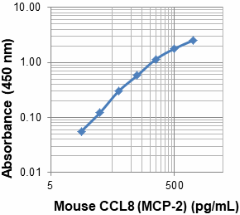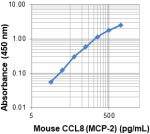- Clone
- Poly5352 (See other available formats)
- Regulatory Status
- RUO
- Other Names
- Monocyte chemotactic protein 2, MCP-2, small inducible cytokine subfamily A, member 8 (SCYA8),Chemokine (C-C motif) ligand 8, CCL8, MCP2
- Isotype
- Goat Polyclonal IgG
- Ave. Rating
- Submit a Review
- Product Citations
- publications

| Cat # | Size | Price | Quantity Check Availability | Save | ||
|---|---|---|---|---|---|---|
| 535203 | 50 µg | $375 | ||||
CCL8, also known as MCP-2, is a CC chemokine of the monocyte chemoattractant protein (MCP) family that plays key roles in allergic and inflammatory responses. CCL8 (MCP-2) has structural and functional similarity to other family members MCP-1 and MCP-3, and is often co-expressed with these chemokines in mononuclear cells. CCL8 is also constitutively expressed in the skin and lymph nodes of mice.
Mouse CCL8 induces a chemotactic migration of a population of differentiated Th2 cells enriched in IL-5 and IL-25 receptors by binding to the CCR8 receptor. Recent studies have established CCL8 as a critical ligand for driving CCR8-dependent Th2 cell trafficking into the skin, which in conjunction with locally recruited eosinophils drives chronic cutaneous allergic inflammation. CCL8 expression by suprabasal buldge cells has also been experimentally shown to negatively regulate the population of mouse hair follicles by Langerhans cells, further underscoring this chemokines central contributions to maintaining cutaneous immunity.
Product Details
- Verified Reactivity
- Mouse
- Antibody Type
- Polyclonal
- Host Species
- Goat
- Immunogen
- Recombinant protein
- Formulation
- Phosphate-buffered solution, pH 7.2, containing 0.09% sodium azide.
- Preparation
- The antibody was purified by affinity chromatography and conjugated with biotin under optimal conditions.
- Concentration
- 0.5 mg/ml
- Storage & Handling
- The antibody solution should be stored undiluted between 2°C and 8°C. Do not freeze.
- Application
-
ELISA Detection - Quality tested
- Recommended Usage
-
Each lot of this antibody is quality control tested by ELISA assay. For ELISA Detection applications, a concentration range of 0.001 - 1 µg/mL is recommended. To obtain a linear standard curve, serial dilutions of CCL8 (MCP-2) recombinant protein ranging from 15.6 to 1,000 pg/mL is recommended for each ELISA plate. It is recommended that the reagent be titrated for optimal performance for each application.
- Application Notes
-
The Biotin Poly5352 antibody is useful as the detection antibody in a sandwich ELISA assay, when used in conjunction with purified A16070K antibody (Cat. No. 536902) as the capture antibody and Recombinant Mouse CCL8 (MCP-2) (ELISA Std.) (Cat. No. 581709)
- RRID
-
AB_2783340 (BioLegend Cat. No. 535203)
Antigen Details
- Structure
- Chemokine
- Distribution
-
Fibroblast, endothelial cells, monocytes, macrophages, and skeletal muscle cells.
- Function
- CCL8 chemoattracts monocytes, T cells, NK cells, mast cells, eosinophils, and basophils. CCL8 is induced by IL-1β, IFNβ, IFNγ, dsRNA, virus, ConA, and anti-CD2. The induction of CCL8 by IFNγ synergizes with the TLR ligands peptidoglycan (TLR2), dsRNA (TLR3), and LPS (TLR4).
- Interaction
- Monocytes, T cells, NK cells, mast cells, eosinophils, and basophils.
- Ligand/Receptor
- CCR1 (CD191), CCR2 (CD192), CCR3 (CD193), and CCR5 (CD195)
- Cell Type
- Endothelial cells, Fibroblasts, Macrophages, Monocytes
- Biology Area
- Cell Biology, Neuroinflammation, Neuroscience
- Molecular Family
- Cytokines/Chemokines
- Antigen References
-
- Van Damme J, et al. 1992. J. Exp. Med. 176:59.
- Proost P, et al. 1998. J. Immunol. 160:4034.
- Dean RA, et al. 2008. Blood 112: 3455.
- Hori T, et al. 2008. Blood 111:4403.
- Rom S, et al. 2010. FASEB J. 24:2292.
- Struyf S, et al. 2009. Eur. J. Immunol. 39:843.
- Islam SA, et al. 2011. Nat. Immunol. 12:167.
- Gene ID
- 20307 View all products for this Gene ID
- UniProt
- View information about CCL8 on UniProt.org
Related Pages & Pathways
Pages
Related FAQs
- How many biotin molecules are per antibody structure?
- We don't routinely measure the number of biotins with our antibody products but the number of biotin molecules range from 3-6 molecules per antibody.
Other Formats
View All CCL8 Reagents Request Custom Conjugation| Description | Clone | Applications |
|---|---|---|
| Biotin anti-mouse CCL8 (MCP-2) | Poly5352 | ELISA Detection |
Compare Data Across All Formats
This data display is provided for general comparisons between formats.
Your actual data may vary due to variations in samples, target cells, instruments and their settings, staining conditions, and other factors.
If you need assistance with selecting the best format contact our expert technical support team.

 Login/Register
Login/Register 













Follow Us